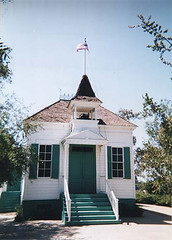This is the earthy novel of small-town life in New Hampshire which sprang into the news some weeks ago when the Gilmanton School Board dismissed young George Metalious from his position as principal of the local grammar school. “They told me it was because of my wife.” said Mr. Metalious. “They don't like her book.” Later, the school board said they had dismissed the young teacher for reasons of their own, which had no bearing on the novel. The author herself still insisted that word had got around Gilmanton that Peyton Place, was a real shocker: “People suddenly decided that George is not the type to teach their sweet innocent children.”
Whatever the merits of the Metalious case, the novel lives up very fully to its advance billing. It opens on a warm autumn day in the Thirties with a comparison between Indian summer and a woman (“Ripe, hotly passionate, but fickle, she comes and goes as she pleases”). What follows is a carefully calculated expose of the comings and goings of a large cast of typical characters in a small New England town until another Indian summer some ten years later.
We learn that life behind the scenes in New Hampshire is not widely different, fictionally speaking, from life in Winesburg, Ohio, Hecate County, Conn. or Gibbsville, Pa. It is only (if that is possible) a little “riper,” a little more “hotly passionate.” a little more frankly detailed—and, perhaps a little more widely inclusive than the small-town chronicles of Messrs. Sherwood Anderson, Edmund Wilson and John O'Hara. The late Sinclair Lewis would no doubt have hailed Grace Metalious as a sister-in-arms against the false fronts and bourgeois pretensions of allegedly respectable communities, and certified her as a public accountant of what goes on in the basements, bedrooms and back porches of a “typical American town.”
Mrs. Metalious, who is a pretty fair writer for a first novelist, comes and goes with the Indian Summer air of an emancipated modern authoress who knows the earthy words and rarely stints to use them. Samples of the adventures in store for readers of Peyton Place would include the following: Successive violations of a 14-year-old girl by her stepfather, leading to an abortion sadly performed by the town's admirable doctor. A murder in a “shacker's” hut with secret burial of the remains in a sheep pen. A suicide in a bedroom closet: A carnival accident which amputates a young girl's arm. A high-school seduction in which the girl is bought-off by the boy's rich and corrupt-father. The seduction of the local dress-shop proprietress by the village schoolmaster. The deflowering of her nubile novelist-daughter by an erotically expert New York literary agent. A lengthy hard-cider binge in a locked cellar involving among others the town handyman who imbibes as a protest against his wife's multiple adulteries. The strangling of a pet tomcat at the feet of a dead spinster by a neurotic boy who has retchingly peered through a backyard hedge at the amorous activities of a neighbor couple.
If Mrs. Metalious can turn her emancipated talents to less lurid purposes, her future as novelist is a good bet. Another good bet is that the citizens of Gilmanton, N.H., can look forward to a busy Indian summer of open or surreptitious reading.
Source Citation Baker, Carlos. "Small Town Peep Show." New York Times Book Review (23 Sept. 1956): 4. Rpt. in Literature Resource Center. Detroit: Gale, 2012. Literature Resource Center. Web. 30 Mar. 2012.
Document URL
http://go.galegroup.com/ps/i.do?id=GALE%7CH1420009812&v=2.1&u=22054_acld&it=r&p=LitRG&sw=w
..
Gale Document Number: GALE|H1420009812


No comments:
Post a Comment